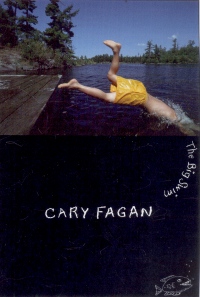| ________________
CM . . .
. Volume XVI Number 23. . . .February 19, 2010 
 |
The Big Swim.
Cary Fagan.
Toronto, ON: Groundwood Books/House of Anansi Press, 2010.
128 pp., pbk. & hc., $9.95 (pbk.), $16.95 (hc.).
ISBN 978-0-88899-970-2 (pbk.), ISBN 978-0-88899-969-6 (hc.).
Grades 4-7 / Ages 9-12.
Review by Beth Wilcox.
*** /4
Reviewed from Advance Reading Copy.
|
| |
|

excerpt:
I wasn't promising camp material. I got frequent stomach aches that the family doctor said were on account of an "anxious disposition," meaning they were all in my head. I hated sports and preferred to either hang around with my two older brothers or write strange stories in my notebooks.
Summer had always meant spending long, free days with my brothers, building balsa-wood airplanes, swimming at the YMHA on Bathurst Street, developing photographs in the basement bathroom.
But this summer they were old enough to get summer jobs. My oldest brother even had a girlfriend. Both the girlfriend and the jobs seemed like a betrayal, made worse by the fact that my parents wouldn't let me stay home by myself.
I argued that going to camp might be a psychologically crippling experience, especially if I turned out to be the only kid who didn't know how to stern a canoe down a waterfall, or start a fire in a downpour, or wrestle a Mississauga rattlesnake into submission. I might end up with such damaged self-esteem that I would need a psychiatrist for the rest of my life. Or die of a snake bite.
When 12-year old Ethan's parents decide to spend July and August vacationing in Europe alone, Ethan is reluctantly sent to a summer-long camp for Jewish children in rural Ontario. Mildly neurotic and unaccustomed to socializing with kids his own age, Ethan's goal for camp is to survive without being hated or being the worst at anything. Luckily, there is Leonard, whose camp nickname is Legs. A seasoned veteran of Camp White Birch and a bit of a misfit, Legs eagerly becomes Ethan's new best friend and doesn't seems to mind being "the worst" at camp activities. To Ethan's great relief, the other boys in his cabin are also friendly, and his special non-allergenic blanket even earns him a nickname - Pinky. While not the most desirable nickname, it is a sign of camaraderie, and Pinky starts to enjoy camp.
The easy summer is disrupted mid-season when Pinky's cabin receives a new, nonconformist camper named Zachary. Zachary has a reputation of being a "bad kid" and a history of being expelled from various other camps. Much to the jealousy of Legs, Pinky and Zach form a hesitant friendship. Zach shows no interest in camp activities, so Pinky is surprised to learn that Zach wants to compete in the Big Swim. At Camp White Birch, the Big Swim is an annual tradition where older campers and counsellors swim across the lake and back, closely monitored by lifeguard boats. No camper their age has ever done it. It is an opportunity for swimmers to prove their strength and endurance, but more importantly, it is a chance to become a camp legend. When Zach's refusal to follow camp rules has him banned from even watching the Big Swim, Zach sneaks out late at night to do the swim on his own, with Pinky and their friend Amber as his witnesses.
With The Big Swim, Fagan has attempted to create something similar to a high interest-low vocabulary adolescent novel for pre-adolescent readers. He has combined the format of a juvenile novel, with its short length, large font, ample white space, and brief chapters, with the wry, unreliable first-person narration of Young Adult fiction.
While Fagan's attempt to create an engaging and relevant book for pre-adolescent readers is largely successful, there are many times where the novel feels either too mature or too young for its implied reader. Older readers may be unimpressed with the characters, including the narrator, whose behaviour, perception, and interests often seem more characteristic of children much younger than 12 years of age. They may also be frustrated by the narrator's disappointing tendency to refrain from pursuing the hints of drama and intrigue that lurk around the camp. At the same time, the narrator's brief lapses into precociousness, such as when he compares a camper to William Holden in the movie Stalag 17, and the slow pace of the first half of the novel, may deter younger readers. However, readers who make it past the book's slow start and are willing to read between the lines will be rewarded with a thoughtful exploration of how children judge each other and the bonds of friendships.
Recommended.
Beth Wilcox is a Master of Arts in Children's Literature candidate at the University of British Columbia.

To comment
on this title or this review, send mail to cm@umanitoba.ca.
Copyright © the Manitoba Library Association. Reproduction for personal
use is permitted only if this copyright notice is maintained. Any
other reproduction is prohibited without permission.
NEXT REVIEW |
TABLE OF CONTENTS FOR THIS ISSUE
- February 19, 2010.
AUTHORS |
TITLES |
MEDIA REVIEWS |
PROFILES |
BACK ISSUES |
SEARCH |
CMARCHIVE |
HOME |
